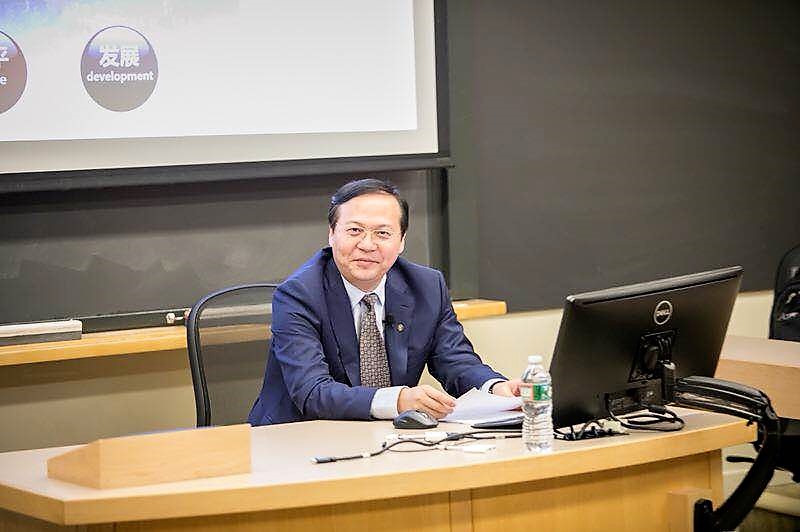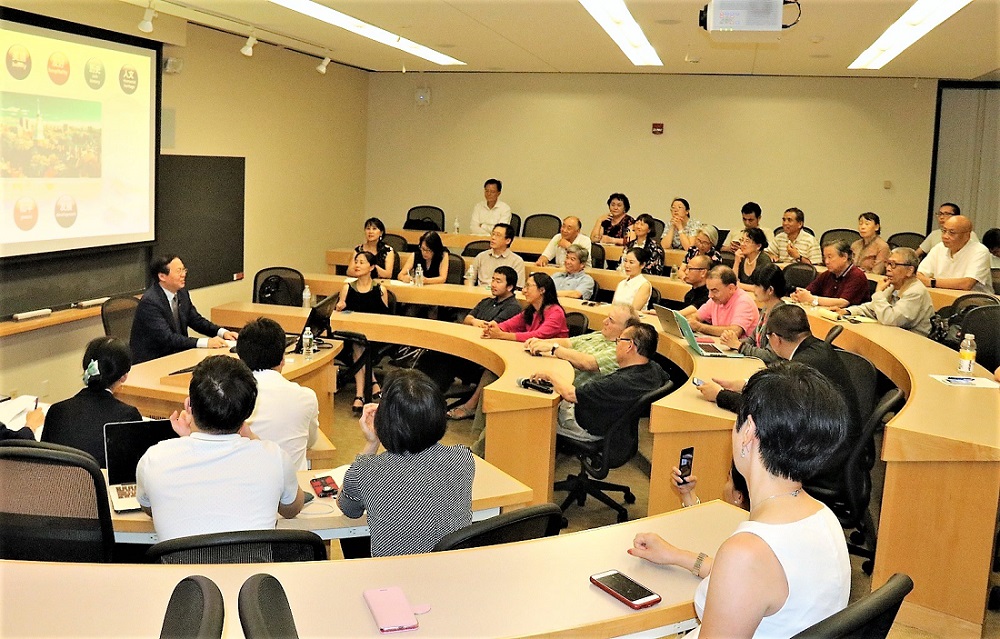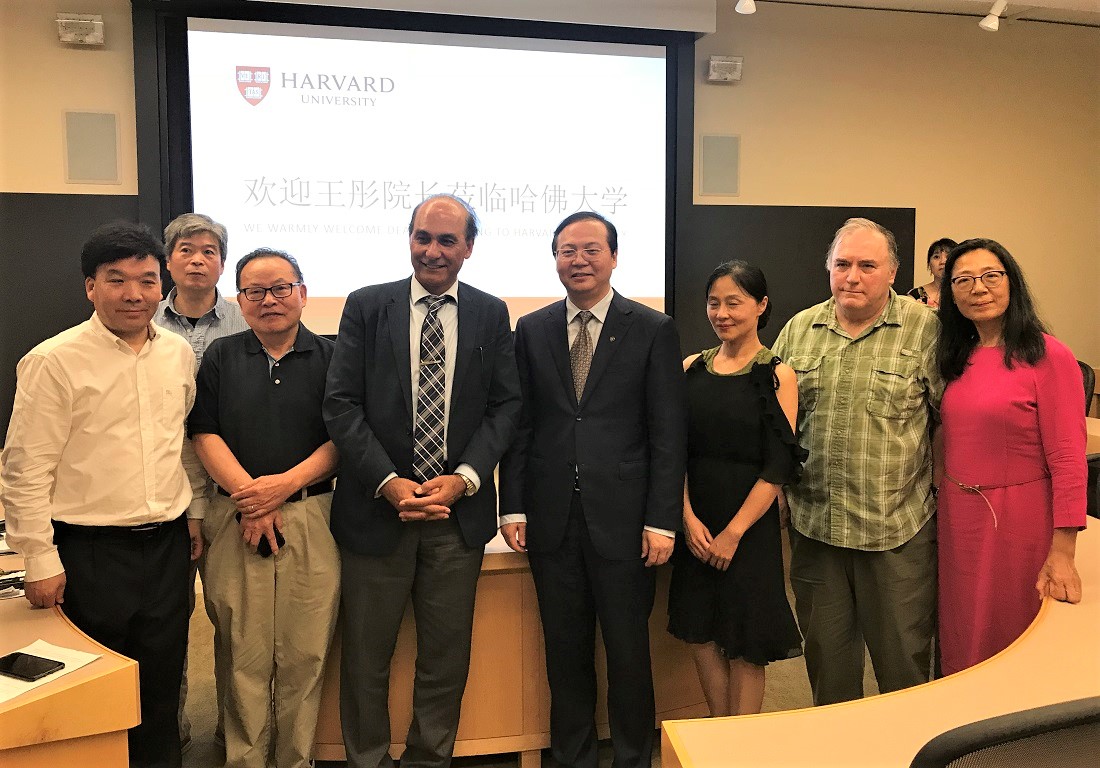Speech by Wang Tong, Dean of China Development Research Institute
Harvard Law School, August 7, 2018
Ladies and gentlemen, dear friends,
Good evening
It’s a honor to meet you all here at Harvard University to exchange our ideas and discuss about meaningful topics. Being part of a think tank, lately I received the same question many times: what happened to this world? Why do I feel constantly anxious and nervous? My answer is that the world is changing, unprecedentedly in its speed, depth and range. Then their follow-up question would be, then is the world changing for better or worse? I’ll look into their eyes and tell them: it depends on you, your dreams and your actions.

Mr. Wang Tong delivered the speech at Harvard Law School.
The world is taken over by a fundamental change and we human beings are realizing an once Utopian dream. We are building a modern Babel tower, the Internet, that ushers us into the Information Age. This is how the experts imagine about this information society in the future: every person and object has an online address, and every single event will be recorded. Translation software will bridge the gaps among different languages and everyone can freely express and communicate their thoughts. With Big Data and Artificial Intelligence, we will be able to fully utilize resources and improve production efficiency.With global academic network, scientists and engineers can work together to overcome those once seemingly impossible problems. The success of human genome project has already demonstrated to us the possibility of this future.
Of course, the changes that the future world is faced with are not simply that, but encompassing ideological, cultural, economic, and political aspects of human society, all of which are steadily and rapidly striding towards the future. The world is getting smaller and smaller. In this global village, we are getting closer and closer to each other, and the influence on each other is getting deeper and deeper. The world is also getting bigger and bigger, more and more things can no longer be solved independently, instead we must work together to achieve a good result. The world is becoming more and more complex, while individualized and decentralized demands are liberated to an unprecedented degree and are met through new means and methods.
Every individual, every institution and every country is looking for their own position and must come up with their own solutions to these changes. I would like to share three quotes of Chinese wisdom regarding to this issue.
The first is a quote from Deng Xiaoping, who was responsible for China’s economic reforms and opening to the global economy. He once said, “Development is the hard principle.”
Development can solve many problems. 40 years ago in China, there were very serious social issues: people were extremely poor; the economy was stagnant; their minds restricted and people lived a substandard life. At that time, if someone was getting married, the first thing to be considered by the newlyweds was how to make the best use of their tiny budget to prepare a banquet to feed their malnourished guests. After 40 years of unremitting efforts in reform and opening up, China succeeded in not only feeding more than 1.3 billion Chinese people, but also significantly improving people’s living standard so that they are now able to pursue
fulfillment in life.We see the weddings today are different than before – it’s more about how unique and impressive they look. The experience of China’s reform and opening up over the past 40 years proves that development is the best way to break through the predicament.
Development produces enormous business opportunities. China is committed to eradicating poverty by 2020, by improving the lives of approximately 70 million people. China will also witness 400 million people moving from rural areas to cities. China also hopes that by 2020, a middle-class consumer market with a population of 600 million will become the driving force of our economy. China is constantly making greater and greater efforts in environmental protection and technological innovation to promote the use of advanced technologies to reduce energy consumption and to achieve sustainable development.
The faster China’s develops and prospers, the more opportunities will be created for the rest of the world. According to statistics from the National Bureau of Statistics, China in the next five years expects to import goods with an estimated value of 8 trillion US dollars and to receive foreign investment of more than 600 billion US dollars.
In the next 15 years, Chinese market will be further expanded and its development will be more comprehensive. It is estimated that it will import 24 trillion US dollars of goods and receive 2 trillion US dollars of direct investment from abroad. The total investment to other countries will reach 2 trillion US dollars.
Today Chinese families install Japanese smart toilets in the bathroom, and eat with German cutlery in the kitchen. While parents use iPhones and iPads from the US, their children watch Harry Potter and The Avengers. There might even be a Nemo toy in their bed.
World Economic Situation and Prospects 2018 published by the United Nations headquarters in New York, pointed out that the global economic growth rate reached 3% in 2017, was the fastest growth since 2011. Among all the countries, China has contributed the most to global economic growth, accounting for about one-third. Since 2013, China has continued to contribute more than 30% to the world economy.
China’s development has not only benefited the vast number of Chinese population, but also created opportunities for other countries. For example, according to statistics, in 2016, Chinese tourists spent about US$13,000 per person when they were travelling in the US. The total expenditures on tourist alone reached US$35.22 billion that year, generating an average daily revenue of US$97 million for the United States.
China seeks for mutual benefit in the course of opening up, constantly improving internal and external connections. That means when we focus on developing own own economy, we also strive to benefit other countries and peoples by contributing more and more to the world and regional economic development.
The second quote comes from German philosopher Arthur Schopenhauer, “By and in himself a man can accomplish very little; he is like Robinson Crusoe on a desert island. It is only in society that a man’s powers can be called into full activity.”
The mainstream of global international relations is to learn from each other’s strengths and to create win-win cooperation. The “Belt and Road Initiative” proposed by the Chinese government which focuses on connectivity and cooperation between Eurasian countries has won wide recognition in the world. In 2017, outbound direct investment made by Chinese companies in 59 countries and regions in the framework of the Belt and Road Initiative amounted to US$14.36 billion last year. Chinese companies from sectors such as infrastructure and power signed US$144.32 billion of new project contracts in 61 countries participating the Belt and Road Initiative, a 14.5%increase comparing to the year before, producing 85.53 billion US dollars in revenue, an increase of 12.6%.

“China’s door of opening-up will not be closed and will only open even wider!” President Xi Jinping’s speech at the Boao Forum for Asia clearly expressed to the world his vision for China. China will implement policies that free up trade and investment, provide pre-establishment national treatment with a negative list, significantly broaden market access, expand the opening up of service industry, and protect the legitimate rights and interests of foreign investors. All enterprises registered in China will be treated equally. China will speed up the negotiation of free trade agreements and investment agreements with relevant countries, to establish comprehensive regional economic partnership and build a global network of free trade zones. China will continue to pursue an open strategy of mutual benefit and win-win cooperation, to share its development opportunities with the rest of the world, and invite countries to benefit from China’s development.
Here I would like to quote from Chinese classics I Ching or the Chinese Book of Changes, “Change overcomes impasse and leads to solution.” It proposes to seek for development through changes. The benign interaction between change and development saturates the practice of reform and opening up in China today, and it is exemplary how Chinese classic culture can be applied to our modern times.
History has proven to us that opening up is a prerequisite and necessary condition for China’s economy to achieve such rapid development. Opening up has also brought China to the forefront of globalization. In the past 40 years of reform and opening up, we have always situated our own development and prosperity in the global context. It can be said that China’s development cannot be separated from the peace and stability of the world, nor is it separable from cultural exchanges with other countries in the world. In return, China is willing to provide more support and make greater contributions to the world. President Xi Jinping has already made a commitment in his statement, “China’s opening up is not a one-man show, but to welcome all parties to participate; it’s not to seek the sphere of influence, but to support development of all countries; it’s not to build our own backyard, but to build a garden shared by all countries.”
Opening-up is not only a necessary premise for China to shift from “high-speed development” to “high-quality development”, but also for China to effectively promote economic globalization through practical actions.We stand to widely enlarge convergence of interests with other countries to build a community of interests for the benefit of citizens of all countries in the world.
As President Xi has repeatedly pointed out on various occasions: “Reform and opening up is a great course of common prosperity of both China and the world.” “China’s future and destiny are increasingly closely related to the world.” “China cannot develop independently from the world, while the world’s prosperity and stability cannot be separated from China.”
Economic globalization, digitization, peace and development are the irreversible trend of the times and the essence of people’s well-being. “Community of human destiny” as coined by President Xi tells exactly that. As I mentioned earlier, China today needs communication and exchange with the world more than ever, on the other hand, it is even more urgent for the world to deepen its understanding of China. China remains unyielding in accelerating the process of opening up through exchange and assimilation.
Therefore, we have seen that while absorbing and accepting cultures from all over the world, Chinese culture is increasingly integrated into the world and gradually recognized, accepted and participated by the world.
This year’s World Cup just ended in Russia not long ago. The teams with superstar players didn’t survive to the end, instead, the winner French team grabbed the Cup with strong teamwork. And this is what I want to say: to solve global problems such as economic stagnation, wealth inequality, deteriorating ecological environment, prevailing terrorism and the drug problems, countries should respect each other and work together as a team. Only cooperation will lead us the ultimate victory.
The third quote I want to share with you, accompanied me through my youth. It is uttered by a great man of our country, Mao Zedong. He said to a group of youths, “The world is yours and also ours, but in the end it is yours.” Time is fair and ruthless. Many of you here are probably around the same age as me. We are falling behind the times. Time favors our next generation, those young people who are now laughing and running about outside. In the future, they will take up the major role. However what kind of world they will inherit from us is shaped by what we are thinking and doing today.
At the beginning of this year, Mark Zuckerberg of Facebook mentioned in his speech here at Harvard that in a recent survey, people who were born in the 1980s and 1990s around the world were asked about their identity. It turns out the most popular answer is not nationality, religion or race, rather “world citizen.” Then he called on the graduates to “create a world where everyone has a sense of purpose”, which is the work of their generation.
I’m very fortunate to be here at Harvard today. I sense the thriving power of knowledge, as well as her beauty, hospitality, rich history and humanist heritage. I think of Harvard as a symbol of openness, tolerance, peace and development.
Harvard University is among the most famous institution of higher education in the whole world, where the most intelligent people and the most dynamic students will assume their mission in the future. I hope that our choices and actions today will leave them a better future.
